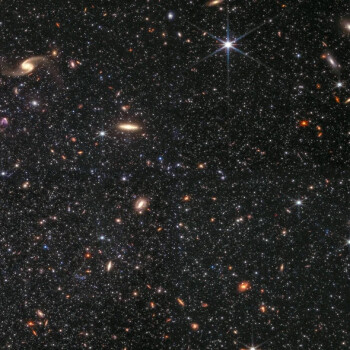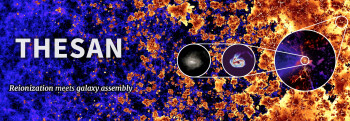Ph.D. - Astronomy
The University of Texas at Austin - 2018
Aaron Smith
Assistant Professor - Physics
Join us in Computational Astrophysics at UTD! Our team pioneers groundbreaking computational tools and theories to tackle key questions in astrophysics and cosmology. Explore the mysteries of high-redshift galaxies and engage in cutting-edge research!
Professional Preparation
B.S. - Physics and Mathematics
Brigham Young University - 2012
Brigham Young University - 2012
Research Areas
Technical Research Summary
A major theme of my research is to understand the nature of the first galaxies and the ensuing cosmic phase transition known as the Epoch of Reionization. I lead the THESAN and THESAN-ZOOMS (www.thesan-project.com) simulation campaigns to produce realistic galaxies and synthetic observations, enabling a more fruitful exploitation of current and forthcoming data. I am the author of the state-of-the-art COLT (colt.readthedocs.io) Monte Carlo radiative transfer and AREPO-MCRT moving-mesh radiation-hydrodynamics codes. My research spans multiple subfields in astrophysics and provides strong synergy with theory and observation.Publications
Multi-resonant-line radiative transfer: Lyman-Alpha fine structure and deuterium coupling 2026 - Journal Article
The thesan-zoom project: Mystery N/O more — uncovering the origin of peculiar chemical abundances and a not-so-fundamental metallicity relation at 3 < z < 12 2026 - Journal Article
Correction to: The thesan project: public data release of radiation-hydrodynamic simulations matching reionization-era JWST observations 2026 - Journal Article
The thesan-zoom project: star formation efficiencies in high-redshift galaxies 2026 - Journal Article
Multi-Resonant-Line Radiative Transfer: Lyman-Alpha Fine Structure and Deuterium Coupling 2026 - Journal Article
The thesan-zoom project: The Hidden Neighbours of O i Absorbers during Reionization 2026 - Journal Article
The galaxy-IGM connection in THESAN: the physics connecting the IGM Lyman- α opacity and galaxy density in the reionization epoch 2025 - Journal Article
The THESAN-ZOOM project: Long-term imprints of external reionization on galaxy evolution 2025 - Other
Awards
NSF Graduate Research Fellowship Program (GRFP) - The University of Texas at Austin [2014]
Appointments
Assistant Professor, Physics
The University of Texas at Dallas [2023–Present]
The University of Texas at Dallas [2023–Present]
ITC Postdoctoral Fellow
Harvard University [2022–2023]
Harvard University [2022–2023]
NASA Einstein Fellow
Massachusetts Institute of Technology [2018–2022]
Massachusetts Institute of Technology [2018–2022]
News Articles
JWST’s Glimpses of Early Galaxies Could Shed Light on Dark Matter
 The THESAN-HR simulations were featured in by Scientific American, exploring how the James Webb Space Telescope might be able to distinguish between competing dark matter models by studying primordial dwarf galaxies.
The THESAN-HR simulations were featured in by Scientific American, exploring how the James Webb Space Telescope might be able to distinguish between competing dark matter models by studying primordial dwarf galaxies.
New Record-Breaking Simulation Sheds Light on ‘Cosmic Dawn’
 The THESAN simulations were featured in Scientific American, highlighting the capabilities of the new large-volume cosmological radiation-hydrodynamic simulations of the Epoch of Reionization.
The THESAN simulations were featured in Scientific American, highlighting the capabilities of the new large-volume cosmological radiation-hydrodynamic simulations of the Epoch of Reionization.